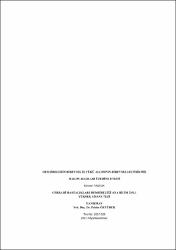Hemşirelerin bireysel iş yükü algısının bireyselleştirilmiş bakım algıları üzerine etkisi
Özet
Amaç: Bu çalışmanın amacı hemşirelerin bireysel iş yükü algısının bireyselleştirilmiş bakım algıları üzerine etkisini incelemektir.
Yöntem: Tanımlayıcı olarak planlanan çalışmaya Mart-Mayıs 2016 tarihleri arasında Afyonkarahisar il merkezi ve ilçe hastanelerinde çalışan 424 klinik hemşiresi dahil edilmiştir. Veriler hemşire tanıtım bilgi formu, Bireysel İş Yükü Algı Ölçeği ve Bireyselleştirilmiş Bakım Ölçeği-Hemşire A versiyonu ile toplanmıştır. Verilerin analizinde sayı, yüzde dağılımı ve aritmetik ortalama kullanılmıştır. Ölçekler arasındaki ilişki ve etki Pearson Korelasyon Analizi ve Regresyon Modeli ile incelenmiştir.
Bulgular: Çalışmaya katılan hemşirelerin %86,3’ü kadın olup, çoğunluğu 35-44 yaş arasındadır. Hemşirelerin %35,4’ünün lisans mezunu, %50’sinin Merkez Devlet Hastanesinde çalıştığı, %32,5’inin çalışma yılının 1-5 yıl arası olduğu belirlenmiştir. Hemşirelerin Bireysel İş Yükü Algı Ölçeği puan ortalamaları 3,50±0,67 iken, Bireyselleştirilmiş Bakım Ölçeği puan ortalamalarının 3,48±0,82’dir. Bireysel İş Yükü Algı Ölçeği’ne göre hemşirelerin olumlu yönde en fazla “meslektaş desteği”, en az “yönetici desteği” alt boyutlarından etkilendikleri bulunmuştur. Bireyselleştirilmiş Bakım Ölçeği’ne göre ise hemşirelerin en olumlu “klinik durumda bireysel özellikler”, en olumsuz “kişisel yaşam durumu” alt boyutlarını algıladıkları belirlenmiştir. Hemşirelerin genel bireysel iş yükü algısı ile genel bireyselleştirilmiş bakım algısı arasında pozitif ve anlamlı bir korelasyon -ilişki- bulunmuştur. Regresyon analizine göre bireysel iş yükü algısındaki (genel hemşire memnuniyeti) bir birimlik artış bireyselleştirilmiş bakım algısı üzerinde 0,447 birimlik bir artışa neden olduğu saptanmıştır.
Sonuç: Bireysel iş yükü algısının bireyselleştirilmiş bakım algısı üzerinde anlamlı bir etkisinin olduğu; bireyselleştirilmiş bakım algısı üzerinde en yüksek etkiye sahip bireysel iş yükü alt boyutunun birim desteği olduğu belirlenmiştir. Aim: The purpose of this study was to examine the influence of individual workload perception of nurses on individualized care perceptions.
Method: A total of 424 clinic nurses working at the hospitals in the Afyonkarahisar city centre and districts during March and May 2016 were included in the current research planned as a descriptive study. The data were collected with the nurse introduction information form, the Individual Workload Perception Scale, and the Individualized Care Scale-Nurse A version. In the analysis of the data, score, percentage distribution, and arithmetic mean were implemented. The correlation between the scales were analysed with the Pearson Correlation Analysis and Regression Model.
Results: In the present study, 86,3% of the nurses were female and most of them were between 35 and 44 years old. Of the nurses, 35,4% had bachelor's degree, 50% were working at the Central State Hospital, and 32,5% had work experience of 1-5 years. The mean scores of the nurses’ Individual Workload Perception Scale and Individualized Care Scale were 3,50±0,67 and 3,48±0,82, respectively. According to the Individual Workload Perception Scale, it was revealed that the nurses were positively influenced by the subscale of “support of colleague” at most and by the subscale of “support of manager” at least. It was determined that the nurses perceived the subscale of “clinical situation” as the most positive one and “personel life situation” as the most negative one according to the Individualized Care Scale. It was found that there was a positive and meaningful correlation -relationship- between nurses’ perceptions of general individual workload and general individualized care. According to the Regression analysis, it was detected that an unit increase in the perception of individual workload (overall nurse satisfaction) caused an increase of 0,447 in the perception of individualized care.
Conclusion: It was concluded that the perception of individual workload had a meaningful effect on the perception of individualized care. It was found that the subscale of the individual workload “support of unit” had the highest effect on the perception of individualized care.
Bağlantı
https://hdl.handle.net/11630/8373Koleksiyonlar
- Yüksek Lisans Tezleri [667]



















